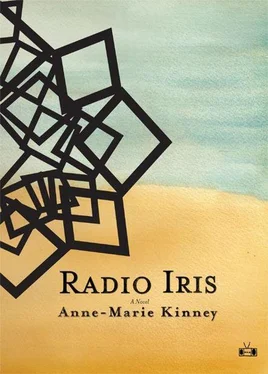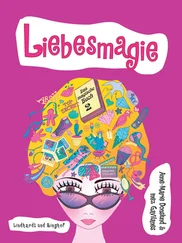Some time later, he called from a business trip to tell her he wouldn’t be in that day, or the next day, and that he wasn’t going to tell her where he was so that she wouldn’t have to lie if anyone asked.
“You’ll just say you don’t know. Okay?”
“Okay.”
He hung up before it occurred to her to ask who he was avoiding, when they might call, or what she was to do in the meantime. She wouldn’t have asked anyhow. As long as her phone kept ringing, as long as she had a to-do list, as long as she had a place to go every morning and enough money to keep herself alive, and as long as she didn’t have to look directly at the earth’s edge, then nothing else mattered.
****
Iris blinks heavily and realizes she must have been in the shower a long time, because the water is freezing. The CD is back at the beginning, and Buddy Holly is singing about that crazy feeling again. She shuts off the water and rubs out the goosebumps on her arms.
She dries off and pads into the kitchen, where she sees that her grocery bag is still sitting by the door. She checks the milk and finds that it has gone lukewarm, so she pours it all down the drain, and she won’t eat the raisin bran dry, so really, it is as though she hasn’t run the errand at all. She wasn’t even at the store. She didn’t see anything.
When he gets home, Neil drops his things in the kitchen and examines the contents of his fridge. He has an urge to cook something really elaborate and messy, like enchiladas suiza, and use every utensil and piece of cookware in the house, or something that would require a whole lot of chopping, like ratatouille. Just really fucking COOK, he thinks. But he doesn’t have any real food, just a box of mac n’ cheese and a mysterious Tupperware container he isn’t about to open. And he’s too tired to go to the store, and he’d resent his own whimsy when it came time to do the dishes anyhow, so he makes the mac n’ cheese and leaves it to cool on the counter.
He steps over to the couch and lies down, kicking off his shoes and letting them drop off the side with a thud. He rolls over onto his stomach and shuts his eyes— just for a second, he thinks, his eyeballs dry and throbbing. Tomorrow is his first real day off in weeks. He tries to think about what he’ll do with the time. He’ll run some errands, sure, but then what? He pictures himself strolling through some park with coffee and the paper, but he doesn’t know what park it’s supposed to be. Has he even been to any parks in town? He can’t even remember seeing any. He pictures himself going places, far away places, marching in step with the plump yellow sun, following its command as though he is the only one listening hard enough to hear it. His mind’s eye is filled with the glow of this imaginary sun, and he sinks into it, into a heavy sleep, the phone in his front shirt pocket pressing itself into his chest.
Iris decides to do laundry to clear her mind. If she focuses on a specific task, then she can forget that this day ever happened, and anything forgotten is not any thing at all. She throws clothes gathered on the bathroom floor into the hamper and hauls it all to the laundry room, detergent and jar full of quarters clutched to her chest.
She loads the laundry and sits on the floor watching her clothes swim like soapy anemones through the glass. The room is so warm and white that she loves to wait while the machines run, despite the multiple signs warning of toxic substances in the room. She can’t imagine there could be anything so toxic here, and what does toxic even mean? She breathes in the smell of other people’s soap and fabric softener, crumpled sheets of it haunting the corners of the room like dust.
When it is time to switch her clothes to the dryer, she finds that all three of them are filled with dry clothes that are cool to the touch. The clothes are a little stiff and musty, as though they’ve been sitting a long time. Someone has forgotten that they ever did laundry, or decided to simplify their life, right in the middle of a cycle, relinquishing material things once and for all. She could imagine herself doing the former, but not the latter. She pulls the clothes out of two dryers and stacks them on the folding table, loading her own in their place. It is always startling when she is reminded of the neighbors she sees so rarely. It is as though there is a silent understanding that no one will walk the halls at the same time. She feels awkward handling someone else’s underwear and children’s socks, so she goes back to her apartment after loading the quarters and pressing start.
She fills and fires up the tea kettle, and then hears her phone ringing from her purse. She lowers the flame of the stove before going to answer it; the screen tells her it’s Neil.
“Hello?”
He doesn’t say anything.
“Hello? Hello?”
Still nothing, and Iris sits down, listening as the silence takes the form of an underwater beat.
“Hello?” she tries one more time.
Then she turns up her phone’s volume, so the beat is more distinct, and gradually, she begins to think she hears soft breathing.
He’s asleep, she thinks, and covers the other ear so she can hear better.
It’s been a while since he’s pocket-dialed her. When it happens, she always stays on the line. Usually, she hears the rustling of his pocket, muffled voices, maybe the sound of a car door slamming. Now she turns in to face the couch cushions, and pictures Neil curled up like a cat beside her.
The beat she perceives sounds labored, somehow, as though it is coming up against resistance. It has force behind it, and she thinks the breathing sound is strained too. It strikes Iris how pitiful it might seem that she is clinging to this voyeurism as some proof of closeness, but she can’t help but cling, knowing all too well how easily he can slip away. Shortly after the accident, before they packed up the house and moved away, he started going for walks after dinner, long walks that would have him gone until very late. Iris always wanted to follow him, but she restrained herself, sensing that he wanted to be alone. She would lie in bed and imagine him scaling mountains, finding caves in forests she imagined could be found beyond the limits of their small town.
When he kept doing it in their new town, their parents came to accept that he needed to go off by himself. His therapist told them it was perfectly normal. His therapist told them to let him have this one private thing. That’s what Iris gleaned, at least, from listening in on her parents’ side of the phone conversations, crouched outside an open window, hugging Sebastian’s face to her hip with the mosquitoes buzzing.
Then one night, he didn’t come back. In the morning, their parents were struck dumb with worry. This time, Iris thought to listen in on the phone in her parents’ bedroom as her mother muttered unintelligibly to the police on the kitchen phone, her father standing back with arms crossed against the living room wall. The police told her to calm down. They took her name and told her they couldn’t file a missing persons report this soon, and they asked her, Finch, huh? Isn’t your boy the same one who’s always wandering at all hours? Her mother hung up then, and Iris listened to the dial tone for a minute.
When Neil walked through the front door a couple of hours later and climbed the stairs to his bedroom, he didn’t say a word to anyone. Their parents stood at the bottom of the stairs and watched him in silence, clutching their own hands. Iris was stepping out of the bathroom in her towel at the top of the stairs as he came up, and she was so startled to see him, as though she had already settled on the idea that he had run away for good, and she recalls now how un-startled he looked, how thoroughly aloof, as he walked past her into his room, and shut the door.
Читать дальше












